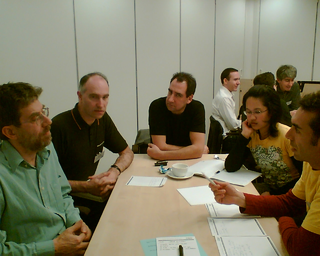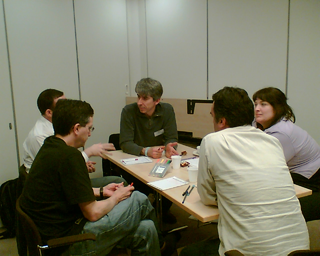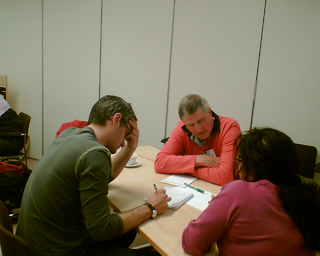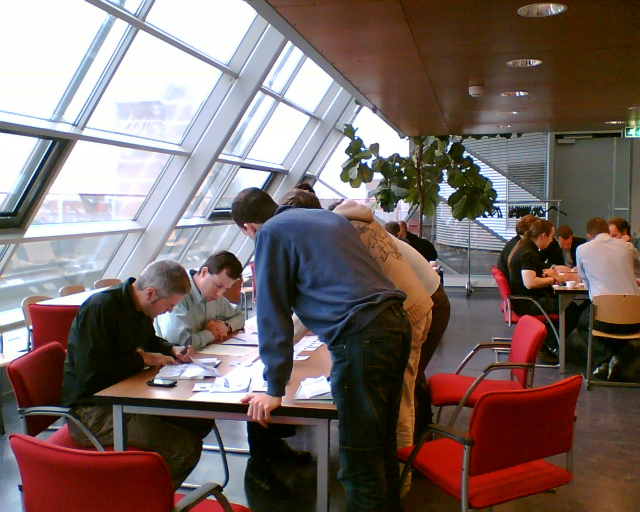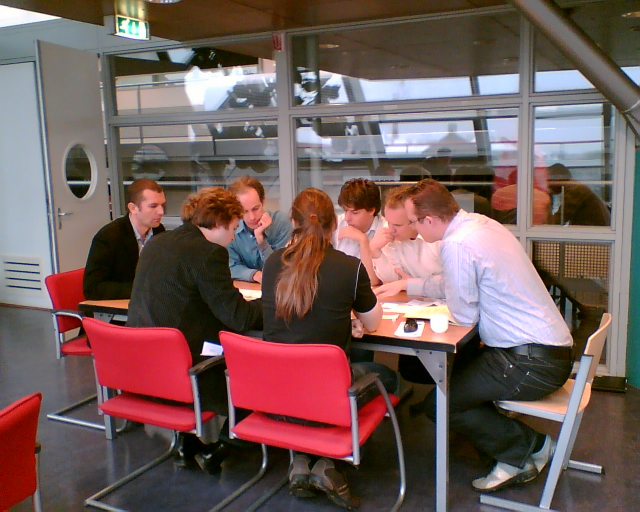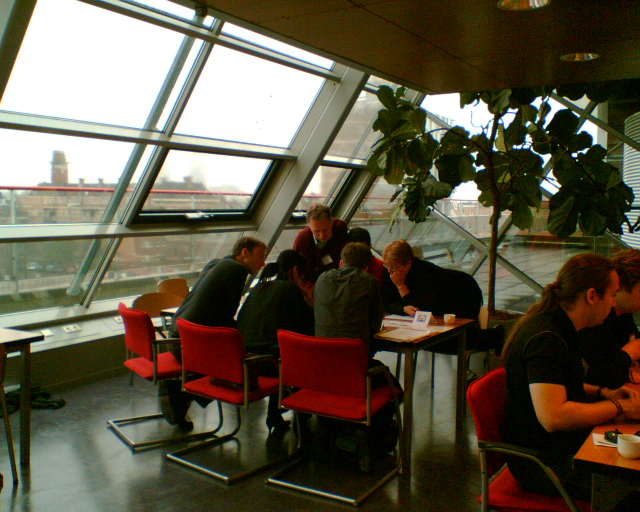‘SimBlogging‘ offers a his and hers viewpoint as Pascal and Portia timebox-blog simultaneously
From dawn …
At the crack of dawn, organisers and friends hold a standup to kick off the day. Most of the material had already been brought in and prepared the night before, after the pre-conference dinner and drinks. Tasks are quickly written on sticky notes; the wall serves as our kanban board. All the tasks quickly move to Done as everyone chips in. Participants trickle in, grab some coffee to wake up and register. XP Days is rolling.
The day traditionally starts with the Official One Minute Presentations (OOMPs), shortened to 30 seconds because of the large number of sessions, where presenters pitch their session in weird, funny and unusual ways. This immediately sets the right tone for the conference: Agile is serious, but we don’t take ourselves too seriously.
… till dusk
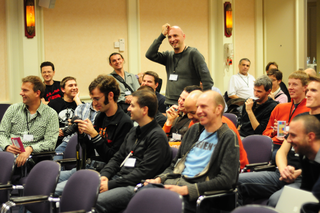 Every day closes with the mirror of the OOMPs, the Official One Minute Participant Presentations. For each session in turn, session participants stand up and tell us what the session was about and what they learned, so that everybody at least gets some information about the sessions they missed. Judging by the smiling faces everybody had a great day taking part in interesting sessions.
Every day closes with the mirror of the OOMPs, the Official One Minute Participant Presentations. For each session in turn, session participants stand up and tell us what the session was about and what they learned, so that everybody at least gets some information about the sessions they missed. Judging by the smiling faces everybody had a great day taking part in interesting sessions.
At XP Days Benelux we don’t differentiate between speakers and participants, other than that speakers get in for free. XP Days Benelux is about sharing, communication and collaboration.
Gaming into the night
 Each participant could choose a persona for their badge. Nicole and Johan had devised a social game with the session proposal personas: participants should seek out people with interesting personas to create a team. Teams had to present themselves at the closing and won prizes. The persona game was a great way to meet with new people and created a lot of buzz during the whole conference.
Each participant could choose a persona for their badge. Nicole and Johan had devised a social game with the session proposal personas: participants should seek out people with interesting personas to create a team. Teams had to present themselves at the closing and won prizes. The persona game was a great way to meet with new people and created a lot of buzz during the whole conference.
The fun and discussions continued well into the night at the bar (with free drinks thanks to our sponsors) and at dinner. Conversations continued well into the night at the bar. The more energetic and competitive participants played board games until 2:30 at the Games Night.
House rules
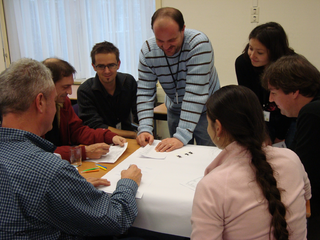 At the start of the conference we explain that XP Days Benelux has only one rule:
At the start of the conference we explain that XP Days Benelux has only one rule:
Participants participate
Most of the sessions are interactive, participative and invite discussion. For the organisers, there’s very little work to do after the sessions start. We try to manage with a light touch. We offer the participants the context in which they can create their conference. Two examples of participants taking responsibility were:
- Jamie and Joke stepping in to organise an Open Space session and an impromptu presentation about Agile Analysis to replace two cancelled sessions.
- A group of participants helping the friendly ladies from Koningshof plan the asymmetric coffee breaks on Friday afternoon.
Sessions
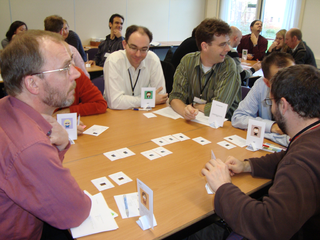 The Critical Chain session by Christophe and Olivier let us build cars with Lego to improve our planning prowess. Not surprisingly, the two teams that collaborated and shared knowledge did better than the other teams.
The Critical Chain session by Christophe and Olivier let us build cars with Lego to improve our planning prowess. Not surprisingly, the two teams that collaborated and shared knowledge did better than the other teams.
Seeking to Perceive more than to be Perceived by Emmanuel and Bernard let us experiment with three communication tools, “Investigate Protocol”, “Soft Focus” and “Emic Interviewing”. The aim of the session was to come up with ideas and a plan to improve next year’s conference. There were some good ideas in the session. If you want to help make them reality, contact us and volunteer for XP Days Benelux 2009.
Vera, Portia and I ran the Business Value Game with five teams. The participants were really absorbed by the game. The standup retrospectives allowed the players to reflect on the questions raised by the game. One of the takeaway points from the session was that we need to have a (probably difficult) conversation about the way our company, our team prioritises because that will reveal what we really value.
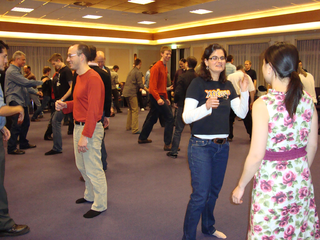 A whole room of Agilistas was rapt listening to Portia retell the Snow White fairy tale in the “Mirror Mirror… Why Me?” session. The participants speed-networked and reflected before working together to come up with a dwarve dream team to realise their fantasy project. The session ended on a high note with the “one minute investor pitches” where the projects and the teams were presented.
A whole room of Agilistas was rapt listening to Portia retell the Snow White fairy tale in the “Mirror Mirror… Why Me?” session. The participants speed-networked and reflected before working together to come up with a dwarve dream team to realise their fantasy project. The session ended on a high note with the “one minute investor pitches” where the projects and the teams were presented.
Including “Working with Resistance” in the program was a bit of a gamble. Would participants be interested in an Aikido session? We’re happy that Olivier Costa proposed this session, because a packed room participated in the exercises and stood in awe at the demonstrations by Olivier and his sensei Frank. After a whole day of working with our heads and hearts, this session got our body working. The lessons for introducing change are clear: work with the other’s energy, not against it.
Done
Another XP Days Benelux is over.
We’re collecting the feedback and ideas of participants and organizers to improve next year’s edition. If you want to make XP Days Benelux 2009 better, contact us to become part of the organising team.
—
Photos by Xavier Quesada and Portia Tung
